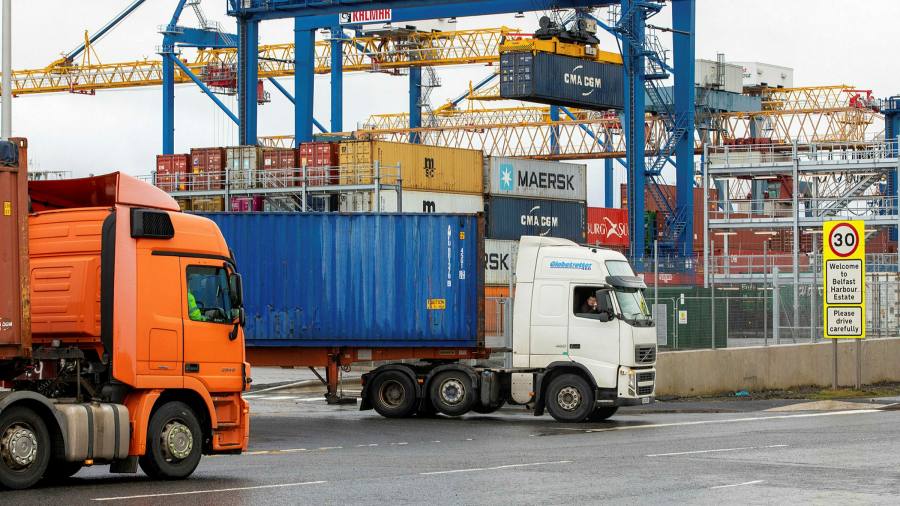
UK set to extend Northern Ireland ‘grace periods’ for third time
Brexit updates
Sign up to myFT Daily Digest to be the first to know about Brexit news.
The UK government is to extend the so-called “grace periods” designed to ease the burden of a contentious section of the Brexit withdrawal agreement governing post-Brexit trade with Northern Ireland.
The move, which is expected to be formally confirmed in a written ministerial statement to Parliament early this week, is designed to allow negotiations over the future of the problematic accord, known as the Northern Ireland protocol, to continue for another few months.
Both sides said they were seeking to avoid a repeat of the tensions dubbed “sausage wars” by some parts of the pro-Brexit UK press earlier this year, and allow more time to negotiate solutions to the issues caused by the protocol.
Two senior EU officials with knowledge of EU-UK discussions said the anticipated extension would not provoke a strong reaction in Brussels.
“The idea is that the UK will continue to apply the same conditions and we will assume that this continues to allow for the discussions to conclude,” said one of the EU officials.
Lord David Frost, the UK minister in charge of Brexit, has demanded sweeping changes to the protocol, which he has warned is “not sustainable” in its current form because of the bureaucratic burdens that are facing British businesses sending goods to the region.
Under the terms of the agreement all goods travelling from Great Britain to Northern Ireland must follow EU customs rules and product regulations.
The bureaucratic requirements, including export health certificates, were initially eased by “grace periods”, lasting between three and six months, that were designed to reduced the amount of paperwork to give businesses time to adjust.
The grace periods were extended, first in March unilaterally by the UK and then again in June, with the mutual agreement of Brussels. The latest extension is due to expire in October.
The fresh extension will allow talks to continue on UK demands for changes to the protocol. However, officials on both sides said talks over the summer had made little progress, with the UK and EU still taking opposing approaches to resolving the difficulties.
In a speech last weekend to the British-Irish Association, Frost repeated that the UK was seeking a fundamental rewriting of the protocol, warning that “solutions which involve ‘flexibilities’ within the current rules won’t work for us”.
However, the EU is clear that there is no appetite in the bloc’s capitals to rewrite the protocol and that any solutions must come from flexibilities within the agreement.
That position was reiterated by Leo Varadkar, the Irish deputy prime minister, on Monday. He acknowledged the protocol was causing some “real disruptions”, which the European Commission was open to addressing within the terms of the existing agreement.
“We don’t really see the case for renegotiating it [the protocol] so soon, we think most of the solutions can be found within the existing agreement,” he told BBC Radio 4’s Today programme.
Under the terms of the Northern Ireland Protocol all goods going from Great Britain to Northern Ireland must follow EU customs and product regulations creating a trade border in the Irish Sea that now divides the UK’s own internal market.
The new border checks were required as part of the deal negotiated by UK prime minister Boris Johnson in October 2019 to “get Brexit done” and avoid the return to a north-south trade border on the island of Ireland, which was removed by the 1998 Good Friday Agreement that ended the region’s decades-long sectarian conflict.
Brussels and the Irish government have argued that the UK should conclude a veterinary agreement with the EU to reduce the need for checks on agrifood products, which are causing the bulk of the difficulties. But the UK government has said it cannot accept the required level of alignment with EU laws and standards.
If acceptable solutions cannot be found, Frost has warned that the disruptions to trade between Great Britain and Northern Ireland are already sufficiently serious to justify the use of Article 16. This is a safeguard clause in the protocol that allows for unilateral but limited action by either side to mitigate the effects of the agreement while mutually agreed solutions are negotiated.
Downing Street said it would update parliament “shortly” on what it described as “standstill” arrangements that would provide certainty for business.
Stay connected with us on social media platform for instant update click here to join our Twitter, & Facebook
We are now on Telegram. Click here to join our channel (@TechiUpdate) and stay updated with the latest Technology headlines.
For all the latest Education News Click Here
For the latest news and updates, follow us on Google News.

